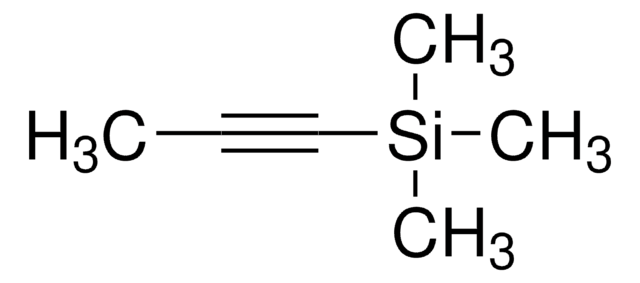Wichtige Dokumente
About This Item
Empfohlene Produkte
Dampfdruck
35 mmHg ( 37.7 °C)
Qualitätsniveau
Assay
99%
Form
liquid
Brechungsindex
n20/D 1.425 (lit.)
bp
131-132 °C (lit.)
mp (Schmelzpunkt)
−103 °C (lit.)
Dichte
0.751 g/mL at 25 °C (lit.)
SMILES String
CCCC#CCCC
InChI
1S/C8H14/c1-3-5-7-8-6-4-2/h3-6H2,1-2H3
InChIKey
GZTNBKQTTZSQNS-UHFFFAOYSA-N
Suchen Sie nach ähnlichen Produkten? Aufrufen Leitfaden zum Produktvergleich
Verwandte Kategorien
Allgemeine Beschreibung
Anwendung
Signalwort
Danger
H-Sätze
Gefahreneinstufungen
Asp. Tox. 1 - Eye Irrit. 2 - Flam. Liq. 3 - STOT SE 3
Zielorgane
Respiratory system
Lagerklassenschlüssel
3 - Flammable liquids
WGK
WGK 3
Flammpunkt (°F)
84.2 °F - closed cup
Flammpunkt (°C)
29 °C - closed cup
Persönliche Schutzausrüstung
Eyeshields, Faceshields, Gloves, type ABEK (EN14387) respirator filter
Hier finden Sie alle aktuellen Versionen:
Besitzen Sie dieses Produkt bereits?
In der Dokumentenbibliothek finden Sie die Dokumentation zu den Produkten, die Sie kürzlich erworben haben.
Kunden haben sich ebenfalls angesehen
Unser Team von Wissenschaftlern verfügt über Erfahrung in allen Forschungsbereichen einschließlich Life Science, Materialwissenschaften, chemischer Synthese, Chromatographie, Analytik und vielen mehr..
Setzen Sie sich mit dem technischen Dienst in Verbindung.



